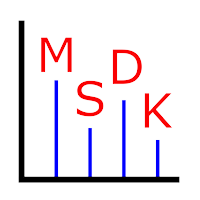How to contribute to MSDK
There are several steps you need to follow in order to contribute your code to MSDK. If you are not familiar with GitHub, this might seem cumbersome at first, but you will surely appreciate the power of this workflow later. Steps 1-3 only need to be performed once, when you make your first contribution.
- Create a personal account on GitHub.
- Fork the MSDK repository. Now you have created your own, personal copy of MSDK at GitHub.
- Clone the newly forked git repository (https://github.com/YOUR-USERNAME/msdk.git) to your PC, either using the git clone command, or using your favorite IDE. Now you have created a local copy of your own GitHub repository. This copy will contain the master branch.
- In your local, cloned repository, create and check out a new branch for the feature or change that you are planning to work on.
- Perform your development on this new branch, and commit your changes with meaningful commit messages (multiple commits are fine). Note that all commits happen only within your local git repository.
- When you are finished, push your branch to your on-line repository on GitHub.
- Go to the website of your repository on GitHub and create a pull request to the original MSDK repository's master branch. We will review your pull request and provide comments. You can update your code and push new commits into the same branch of your own GitHub repository. These commits will be automatically added to the pull request.
- When everyone is happy, we will merge your pull request and you can delete your branches.
- You can keep your local repository up-to-date with the MSDK development branch by adding the official MSDK repository as a new remote repository and fetching changes from there.
For more information, please check the official GitHub's documentation or ask for help through our Google Group.
Before creating a Pull Request, please make sure that you agree with your code being distributed as part of MSDK under its license.
